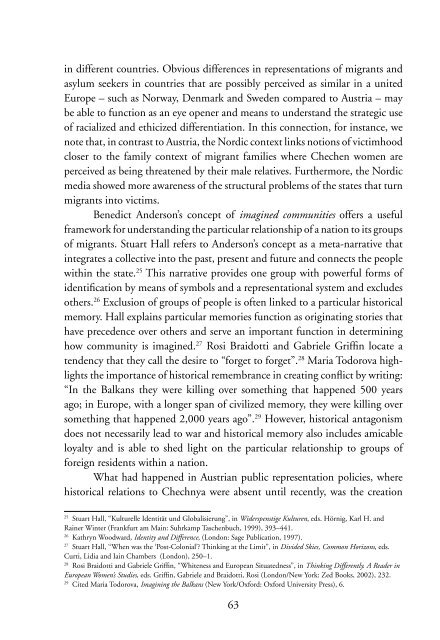Teaching with the third wave new feminists - MailChimp
Teaching with the third wave new feminists - MailChimp
Teaching with the third wave new feminists - MailChimp
Create successful ePaper yourself
Turn your PDF publications into a flip-book with our unique Google optimized e-Paper software.
in different countries. Obvious differences in representations of migrants andasylum seekers in countries that are possibly perceived as similar in a unitedEurope – such as Norway, Denmark and Sweden compared to Austria – maybe able to function as an eye opener and means to understand <strong>the</strong> strategic useof racialized and ethicized differentiation. In this connection, for instance, wenote that, in contrast to Austria, <strong>the</strong> Nordic context links notions of victimhoodcloser to <strong>the</strong> family context of migrant families where Chechen women areperceived as being threatened by <strong>the</strong>ir male relatives. Fur<strong>the</strong>rmore, <strong>the</strong> Nordicmedia showed more awareness of <strong>the</strong> structural problems of <strong>the</strong> states that turnmigrants into victims.Benedict Anderson’s concept of imagined communities offers a usefulframework for understanding <strong>the</strong> particular relationship of a nation to its groupsof migrants. Stuart Hall refers to Anderson’s concept as a meta- narrative thatintegrates a collective into <strong>the</strong> past, present and future and connects <strong>the</strong> people<strong>with</strong>in <strong>the</strong> state. 25 This narrative provides one group <strong>with</strong> powerful forms ofidentification by means of symbols and a representational system and excludeso<strong>the</strong>rs. 26 Exclusion of groups of people is often linked to a particular historicalmemory. Hall explains particular memories function as originating stories thathave precedence over o<strong>the</strong>rs and serve an important function in determininghow community is imagined. 27 Rosi Braidotti and Gabriele Griffin locate atendency that <strong>the</strong>y call <strong>the</strong> desire to “forget to forget”. 28 Maria Todorova highlights<strong>the</strong> importance of historical remembrance in creating conflict by writing:“In <strong>the</strong> Balkans <strong>the</strong>y were killing over something that happened 500 yearsago; in Europe, <strong>with</strong> a longer span of civilized memory, <strong>the</strong>y were killing oversomething that happened 2,000 years ago”. 29 However, historical antagonismdoes not necessarily lead to war and historical memory also includes amicableloyalty and is able to shed light on <strong>the</strong> particular relationship to groups offoreign residents <strong>with</strong>in a nation.What had happened in Austrian public representation policies, wherehistorical relations to Chechnya were absent until recently, was <strong>the</strong> creation25Stuart Hall, “Kulturelle Identität und Globalisierung”, in Widerspenstige Kulturen, eds. Hörnig, Karl H. andRainer Winter (Frankfurt am Main: Suhrkamp Taschenbuch, 1999), 393–441.26Kathryn Woodward, Identity and Difference, (London: Sage Publication, 1997).27Stuart Hall, “When was <strong>the</strong> ‘Post-Colonial’? Thinking at <strong>the</strong> Limit”, in Divided Skies, Common Horizons, eds.Curti, Lidia and Iain Chambers (London), 250–1.28Rosi Braidotti and Gabriele Griffin, “Whiteness and European Situatedness”, in Thinking Differently. A Reader inEuropean Women’s Studies, eds. Griffin, Gabriele and Braidotti, Rosi (London/New York: Zed Books, 2002), 232.29Cited Maria Todorova, Imagining <strong>the</strong> Balkans (New York/Oxford: Oxford University Press), 6.63
















